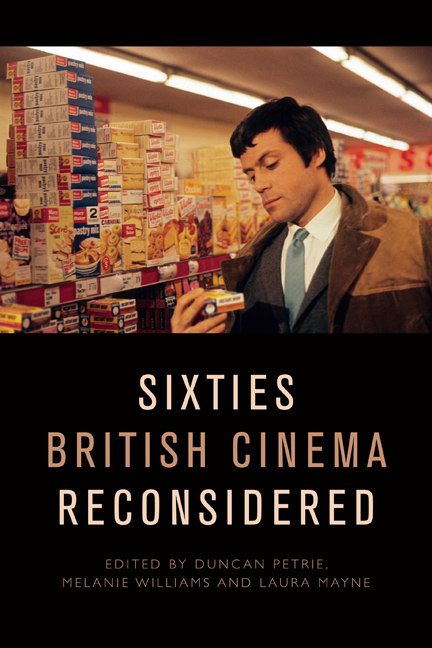Book contents
- Frontmatter
- Contents
- List of Figures and Tables
- Notes on the Contributors
- Introduction
- PART ONE STARS AND STARDOM
- 1 Male Stardom in 1960s British Cinema
- 2 ‘Rebel Rebel’?: Oliver Reed in the 1960s
- 3 Carol White: The Bardot of Battersea
- 4 ‘The Old Wave at Work’: The Transatlantic Stardom of the British Character Actress in the 1960s
- PART TWO CREATIVE COLLABORATIONS
- 5 Woodery-pokery: Charles Wood’s Sixties Screenwriting
- 6 ‘Beyond Naturalism’: Jocelyn Herbert, If . . . (1968) and Design for Performance in 1960s British Cinema
- 7 Kes: From Page to Screen
- 8 ‘I’d like to remember you as you are – as just a grumpy old man’: Joseph Losey and the Making of Figures in a Landscape (1970)
- PART THREE STYLE AND GENRE
- 9 ‘Wholesome rough stuff’: Hammer Films and the ‘A’ and ‘U’ Certificate, 1959–65
- 10 Widescreen Pyrotechnics: Shot Composition and Staging in the Cold War Films of Joseph Losey and Sidney J. Furie
- 11 The Rise and Fall of the Colourful Corporate Fantasy in 1960s British Cinema
- 12 Witchfinders and Sorcerers: Sorcery and Counterculture in the Work of Michael Reeves
- PART FOUR CULTURAL TRANSFORMATIONS
- 13 ‘An Impulse of Anger, Instantly Regretted’: Rebellion and Reaction in the Early-1960s Naval Film
- 14 Narratives of Race and Identity in Sixties British Cinema
- 15 Panic at the Disco: Brainwashing, Alienation and the Discotheque in Swinging London Films
- Index
5 - Woodery-pokery: Charles Wood’s Sixties Screenwriting
Published online by Cambridge University Press: 22 September 2020
- Frontmatter
- Contents
- List of Figures and Tables
- Notes on the Contributors
- Introduction
- PART ONE STARS AND STARDOM
- 1 Male Stardom in 1960s British Cinema
- 2 ‘Rebel Rebel’?: Oliver Reed in the 1960s
- 3 Carol White: The Bardot of Battersea
- 4 ‘The Old Wave at Work’: The Transatlantic Stardom of the British Character Actress in the 1960s
- PART TWO CREATIVE COLLABORATIONS
- 5 Woodery-pokery: Charles Wood’s Sixties Screenwriting
- 6 ‘Beyond Naturalism’: Jocelyn Herbert, If . . . (1968) and Design for Performance in 1960s British Cinema
- 7 Kes: From Page to Screen
- 8 ‘I’d like to remember you as you are – as just a grumpy old man’: Joseph Losey and the Making of Figures in a Landscape (1970)
- PART THREE STYLE AND GENRE
- 9 ‘Wholesome rough stuff’: Hammer Films and the ‘A’ and ‘U’ Certificate, 1959–65
- 10 Widescreen Pyrotechnics: Shot Composition and Staging in the Cold War Films of Joseph Losey and Sidney J. Furie
- 11 The Rise and Fall of the Colourful Corporate Fantasy in 1960s British Cinema
- 12 Witchfinders and Sorcerers: Sorcery and Counterculture in the Work of Michael Reeves
- PART FOUR CULTURAL TRANSFORMATIONS
- 13 ‘An Impulse of Anger, Instantly Regretted’: Rebellion and Reaction in the Early-1960s Naval Film
- 14 Narratives of Race and Identity in Sixties British Cinema
- 15 Panic at the Disco: Brainwashing, Alienation and the Discotheque in Swinging London Films
- Index
Summary
Her class was doing the behaving. My lads are made of flesh … all that leaping up and down in those … that's what I behaviour. That's provocative behaviour. We’ve all got to make allowances, find our equilibrium … at every turn how?
The speaker obviously has something on his mind. The sentences that trail off, the forbidden words ‘gym slips’ which must not be spoken. Then, far odder, the missing word ‘call’ in the statement ‘That's what I behaviour.’ Not a mistake of speech, more like a typo. But I’ve checked, it appeared in more than one draft of the script. It is like a computer virus is loose in the man's brain, swallowing words and then phrases, until at the end, his speech becomes a series of disconnected fragments, like half a telephone conversation overheard.
This is one brief passage from Charles Wood's screenplay of The Knack … and how to get it (1965). It gives a small sense of his unusual way with words, his ability to derail grammar, disarticulate sentence structure, isolate and make strange our commonplace phrases and attitudes, sometimes resulting in uncanny renditions of the garbled way real people express themselves, sometimes garbling further into a more stylised, babbling stream of consciousness, incantatory or delirious, with a dreamlike jumbling of the deepest seriousness and the completely trivial. It is this linguistic invention that led John Gielgud, appearing (as a very thinly disguised parody of himself) in the play Veterans; or, Hair in the Gates of the Hellespont at the Royal Court in 1972, to coin the term ‘woodery-pokery’.
When the writer David Sherwin addressed the gathering at Lindsay Anderson’s memorial in 1994, he sensed a ripple of shock pass through the room: it seemed as if nobody had believed that he, the screenwriter of Anderson's ‘Mick Travis trilogy’, really existed, so secluded had he been. At the 2019 BAFTA Awards, not one of the winning actors mentioned in their acceptance speeches the writers who had created the roles for which they were winning. And this is the screenwriter's lot, or part of it.
None of the great directors of the British New Wave were auteurs in the sense of being writer-directors, all relied on writers, mostly (apart from Sherwin) drawn from the worlds of theatre and literature, many of them barely known and little appreciated by cinephiles.
- Type
- Chapter
- Information
- Sixties British Cinema Reconsidered , pp. 81 - 98Publisher: Edinburgh University PressPrint publication year: 2020



